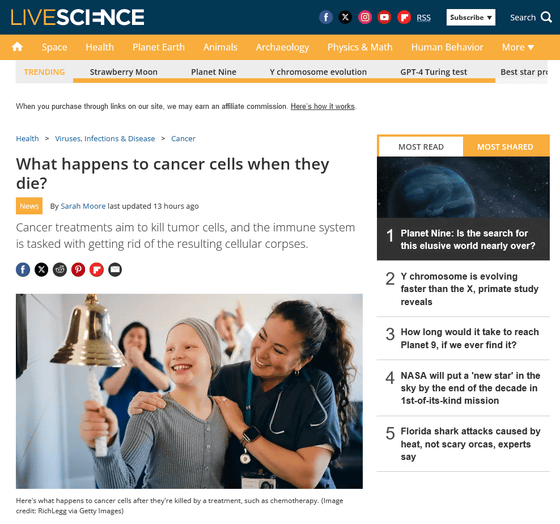What happens when cancer cells die?

When cancer cells die by a process known as apoptosis, their outer membranes are shed and their internal components leak out. This attracts phagocytes that ingest the cancer cell debris and eventually recycle it into components that can be reused by other cells. In some cases, however, the released debris can promote the growth of surviving cancer cells nearby.
What happens to cancer cells after they're killed by treatments? | Live Science

Apoptosis is a process that helps eliminate unwanted or damaged cells from the body. During apoptosis, the cell's outer membrane is shed, releasing its internal components and attracting phagocytes, which devour the cellular debris.
Phagocytes ingest dead cells and break them down into smaller components such as sugars and nucleic acids, even when cancer cells die, ultimately turning them into components that can be reused by other cells.
However, dying cancer cells can sometimes promote the growth of other living cancer cells.
It was first identified in mice in the 1950s, when L. Reves of the Institute of Cytogenetics at the Karolinska Institutet in Sweden published a paper in 1956 titled 'Genetic studies on the relationship between tumor cells and host cells: effect of tumor cells killed by X-rays on the proliferation of adjacent surviving cells'.
Genetic Studies of the Relationship of Tumour–Host Cells: Effect of Tumour Cells Killed by X-rays Upon the Growth of Admixed Viable Cells | Nature
https://www.nature.com/articles/1781391a0
In 2017, a paper was published showing that in mice and in cells on a petri dish, the remains of tumor cells killed by chemotherapy or targeted therapies can trigger the release of pro-inflammatory cytokines, promoting the growth of primary tumors.
Resolvins suppress tumor growth and enhance cancer therapy | Journal of Experimental Medicine | Rockefeller University Press
https://rupress.org/jem/article/215/1/115/42503/Resolvins-suppress-tumor-growth-and-enhance-cancer
Additionally, a 2023 study reported that the nuclei of dying cancer cells can swell and burst, shedding DNA and other molecules into the surrounding area, which can promote cancer metastasis.
Apoptosis-induced nuclear expulsion in tumor cells drives S100a4-mediated metastatic outgrowth through the RAGE pathway | Nature Cancer
https://www.nature.com/articles/s43018-023-00524-z
'The problem with cancer is that we don't have any treatments that can help resolve inflammation, reduce the amount of cytokines, and clear away cellular debris,' Dr. Dipak Panigrahi of the Beth Israel Deaconess Medical Center Cancer Center, who worked on the 2017 study, told Live Science.
Resolvins , molecules derived from omega-3, have been attracting attention because they help remove cellular debris while reducing the effects of inflammation and cytokines, but it is still unclear exactly how resolvins help in the fight against cancer.
Meanwhile, research is also underway into how living cancer cells recognize and respond to signals sent by dying cancer cells, and it has been suggested that blocking the signals sent by dying cells may prevent cancer recurrence.
Related Posts:
in Science, Posted by logc_nt







